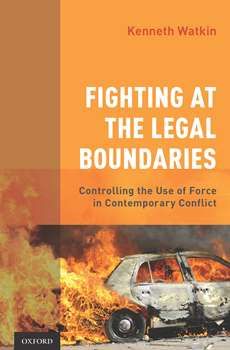

Brigadier-General (Ret’d) Ken Watkin, Law’80, LLM’90, was a military legal officer in the Canadian Armed forces for 28 years, finishing his career as the Judge Advocate General. He has now written a new book arising from his experience advising on international and domestic security operations. In its first review, Fighting at the Legal Boundaries: Controlling the Use of Force in Contemporary Conflict was called “outstanding” and “the most important single-author International Humanitarian Law (IHL) monograph written in many years.”
The text overviews the interaction between the State right to self-defence, IHL, International Human Rights Law (IHRL) and domestic law, illustrated by practical examples such as the use of drone strikes. It then plots a holistic way forward to reconcile the historically separate application of these bodies of law into a general “operational law” for the international community.
“I wrote the book largely because of my experiences in the post 9/11 security environment,” Watkin says. “The Canadian operation in Afghanistan was a complex counter-insurgency and we were in an armed conflict. However, all counter-insurgencies require effective governance and soldiers were being asked daily to use varying levels of force.”
Typically, armed conflicts in the world today are asymmetrical affairs between states and non-state actors. However, it has been 40 years since the Additional Protocols to the Geneva Conventions were produced and it can be a struggle to make the existing law relevant. “I found myself trying to apply 20th-century law to 21st-century security challenges,” Watkin continues. “9/11 brought into cold relief what states are facing this century.”
Along with his experience in the Canadian forces, Watkin was a foreign observer for the Israeli Public Commission into the Gaza flotilla raid. Most recently he was the Charles H. Stockton Professor of International Law at the United States Naval War College in Newport, Rhode Island.
For his part, Watkin hopes the book will help practitioners and academics work together in order to develop a more coherent law governing armed conflicts. “I hope readers learn that the complexity of the security system is far more nuanced than favouring one body of law over another. Human rights advocates favour IHRL and a law enforcement approach. States and state advisors mostly view it through an IHL lens. It is far more layered than that. However, this is the type of conflict that will only be won if you privilege a law enforcement approach.”
By Anthony Pugh